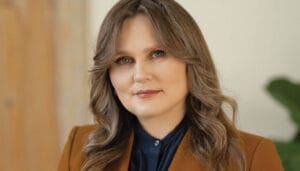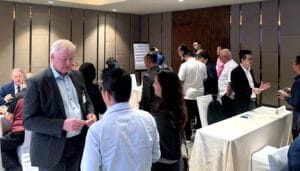Company Spotter Seeks Partners in Its Wide Network

Finnpartnership’s company spotters are seeking companies in emerging markets to introduce future business projects to Finnish companies. Success in this requires comprehensive networks, says Tero Raassina.
Finnpartnership has boosted its Matchmaking service by increasing the use of consultants when looking for new partnerships between Finnish companies and companies in developing countries. Finnpartnership developed and introduced its company spotter operations model in 2013. While doing this, it discovered that, as a rule, companies in developing countries were unable to independently complete the partner search process and did not manage to arouse interest or confidence in Finnish companies in the way they wished. “On the whole, only few potential companies in emerging markets know about the opportunities Finland can offer and certainly not enough to seek cooperation independently. As for Finnish companies, they were cautious about seizing proposals of collaboration coming from developing countries,” says Finnpartnership’s Partnership Coordinator, Birgit Nevala.
Partners for Finnish companies from emerging markets
Finnpartnership’s company spotters pick the most promising companies from among the partnership initiatives and start looking for a suitable Finnish partner for them. The service is free for companies. Company spotters are independent consultants and consulting businesses with excellent knowledge of the field in question, extensive company networks and the ability to visualise forms of international collaboration between companies.
Birgit Nevala explains that the company spotter operations are a kind of mechanism to attract businesses and a quality control system that, after a year’s operation, has proven an efficient cooperation model between public and private players. The service also includes many experts with immigrant backgrounds. “On average, two Finnish companies every month start international cooperation work via Finnpartnership’s supported and monitored Matchmaking process,” Nevala says.
The partnerships created have been with companies in Ecuador, South Africa, Indonesia, India, Columbia, Namibia, Pakistan, Peru and Vietnam. The network of company spotters currently includes about 70 private consultants like Tero Raassina in Finland and emerging markets. This year, the Centres for Economic Development, the Central Chamber of Commerce and regional development centres have joined the group of “barkers” or tip givers in Finland. “Our target is to make the process of bringing companies together even speedier than before in Finland,” Nevala says.
The starting point is the needs of the company from a developing country
Tero Raassina specialises in the countries in the Mekong region and has successfully carried out five assignments for Finnpartnership to bring companies together. These include one Thai and four Vietnamese ICT and clean tech companies that were looking for a Finnish partner. “The needs of the local company are the starting point for the assignment for Finnpartnership. After these are clear, I start piecing together the facts to find out what kind of Finnish company might make a good partner and what would be the best way to start forging the partnership,” Raassina explains.
Finnpartnership selects the company spotter for a specific assignment through competitive bidding. The price of the assignment has been determined beforehand, which means that the selection is made according to specific qualitative criteria. Raassina says that after receiving an assignment, he first acquaints himself with the company in the developing country and conducts a due diligence report. This means looking into the basics, such as the company’s ownership base, balance sheet, yield and the prospects of the line of business. After that he goes through his Finnish networks to find companies that might be interested in collaboration.
“Extensive networks both in Finland and the target area are a necessity in this work. I personally have excellent connections to entrepreneurs in Helsinki, Oulu and Tampere. In the Mekong region, I have worked for a long time in Vietnam, Laos, Myanmar and Thailand,” Raassina says.
20 years’ experience in the Mekong region
Raassina lives in Thailand and has acted as a consultant, investor and owner in companies in the Mekong region for almost 20 years. He knows the area’s ICT sector well, but over the last few years he has focused especially on projects capitalising on renewable energy forms. Raassina has collaborated with Finnish companies in many projects. “I know very well what kind of companies would be able to succeed in this region.”
Raassina stresses that a company spotter’s task is to bring companies together and make the parties understand each other. From there on, it is the responsibility of the companies themselves to build their cooperation and business activities. “It’s important for a company spotter to know when he or she has done their job and when to withdraw from the assignment.”
Myanmar opens for business
Myanmar is the new target of interest for companies in the Mekong region. Finnish companies too have become more and more interested in the opportunities the country has to offer. In February, Team Finland made an export promotion trip to Myanmar, led by the Minister of Economic Affairs Jan Vapaavuori. Raassina began to familiarise himself with the Myanmar market already before the trade sanctions against the country were removed in 2012 and it started to open up to the international community.
He says that there a lot of opportunities in Myanmar, but business risks are high. “Myanmar is still a marginal market for Finnish companies. For example, within the renewable energy sector, there are a dozen companies in Finland with the ability and resources to implement projects in Myanmar.” According to Raassina, Myanmar intends in many things to go straight to using new technology when building its infrastructure. For example for energy production, it will not build coal-fired power plants but will start from a clean slate and focus on renewable energy sources.
Allowances for project funding
Raassina thinks that Myanmar is an excellent example of a developing country where a company would do well to utilise Finnpartnership’s Business Partnership Support at the planning, development and implementation stages of projects. “Due to limited resources, Finns would be better off focusing in certain fields in Myanmar. The ICT, water resources management and renewable energy fields have the most potential.”
According to Raassina, funding projects will become easier with financial instruments offered by multilateral financial institutions, such as the World Bank and the Asian Development Bank, becoming available. Also programmes offered by bilateral donors will in future offer companies many interesting opportunities. “In a country like Myanmar, the first projects will become a reality partly with the help of development funding. Solely from a commercial standpoint, Myanmar is still a very risky country for investment.”
Share on social media


